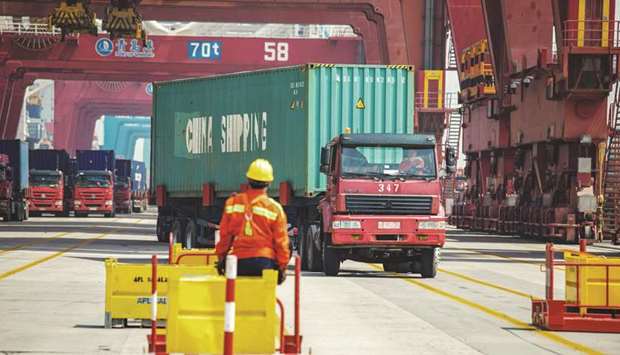China may be poised to take more stimulus steps to drive an expansion showing renewed signs of health. Officials are drafting measures to bolster sales of cars and electronics, according to people familiar with the matter, who asked not to be named because they aren’t authorised to discuss the plan. That news coincided with data showing a 6.4% year-on-year expansion in the first quarter – beating economists’ estimates.
The stimulus move indicates Chinese leaders are stepping up attempts to bolster consumption and mitigate the threats posed by trade tensions with the US.
The government, which already unveiled its most ambitious tax reduction in years, is seeing some signs its efforts are bearing fruit: aside from growth holding up, retail sales expanded a faster-than-forecast 8.7% in March.
The proposals include subsidies for new-energy vehicles, smartphones and home appliances, and are at a consultation stage with other government branches, with no guarantee that they’ll be approved, the people said.
The National Development and Reform Commission, which is said to have drafted the plan, didn’t immediately respond to a fax seeking comment.
For a slowing global economy – on display Wednesday with Germany’s government cutting its 2019 growth estimate – China’s stabilisation and the prospect of stimulus is a relief. It’s also a sharp reversal from as recently as January when key readings were pointing to a pronounced downturn, a factor US officials have touted as leverage in their push for a trade agreement.
“President Trump and other US officials spent much of the last year saying that China’s slowdown was making Beijing desperate for a deal,” said Michael Hirson, Practice Head, China and Northeast Asia at Eurasia Group and a former US Treasury Department official. “Now that China’s growth is recovering, Trump and team will be getting more questions from pundits and the media about whether his leverage is slipping away.”
Speculation over a stimulus move swirled in the markets last week, pushing up shares of domestic carmakers such as BYD Co and automakers in Europe. The Stoxx Europe 600 Automobiles & Parts Index rose 1.8%, led by Volkswagen AG, Daimler AG and Faurecia SA. Home-appliance maker Electrolux AB also advanced.
Specifically, the proposal is said to call for:
n An increase in the number of automobile licences
n A waiver on car-ownership quotas for families who don’t own vehicles
n Subsidies for people who exchange vehicles that are as many as 10 years old for electric, hybrid or fuel-cell vehicles
n No limits or traffic controls for new-energy vehicles
n Encouraging banks to increase auto loans in tier-3 cities or below
n Considering deducting auto purchases from personal income tax
n Subsidies of up to 13% for a home appliance purchase at a maximum of 800 yuan ($120) per purchase
n Exemption of value-added taxes for used-car transactions until the end of 2020
It’s notoriously difficult to own a car in major Chinese cities because of quotas to tackle traffic congestion and air pollution. In Beijing, the annual new vehicle quota dropped to 100,000 in 2018, and each licensed gasoline-fuelled car has to be idle one day a week.
That’s prompted the government to provide incentives for motorists to drive new-energy vehicles – including pure-battery electrics, plug-in hybrids and fuel-cell cars.
“We expect the economy to continue to stabilise in the second quarter, but believe continued policy support is warranted. Government-led infrastructure spending has kick started the recovery. What’s needed still – a turnaround in the private sector to drive self-sustaining growth, say Bloomberg’s economists.”

A staff member watches a truck carrying a container at a port in Qingdao in China’s eastern Shandong province. China may be poised to take more stimulus steps to drive an expansion showing renewed signs of health.
